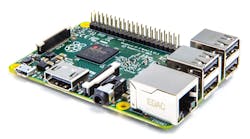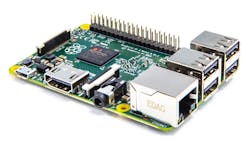The Raspberry Pi 2 has arrived. It is a major improvement over the Raspberry Pi B+ (see “Raspberry Pi B+ Gets A+”) that provided a new layout four USB ports along with an HDMI and 10/100 Ethernet port. The Raspberry Pi 2 (Fig. 1) includes the same 40-pin header and microSD slot. It doubles the amount of RAM to 1 Gbytes but the big change is a move to the 900 MHz, quad core, Broadcom BCM2836.
The Broadcom BCM2836 has a GPU, DSP and four, 32-bit ARMv7 cores. It is six times faster than the prior Raspberry Pi versions. The board also has a 4 pole stereo output and a composite video port in addition to the 1080p HDMI port. Additional I/O includes a CSI camera port and a DSI display port for connecting the Raspberry Pi touch screen display.
Non-volatile storage is provided via a Micro-SD socket compared to the BeagleBone Black that has a 2 Gbytes of e.MMC flash and a 1 GHz, single core, Texas Instrument’s AM335x system (see “Arduino, Raspberry Pi or BeagleBone?”). The BeagleBone Black also has a microSD slot.
Element 14 has bundles that include an 8 Gbyte microSD card with NOOBS (new out of the box software) that makes set up easy. There is a plethora of options available including Linux variants like Arch Linux. Raspian (based on Debian), Ubuntu or Pidora (Fedora remix) plus non-Linux options like RICS OS.
One interesting twist is a new announcement from Microsoft that Windows 10 was going to support Raspberry Pi 2. It is not available yet so you will have to choose one of the prior options if you get a board soon. Mine is in the mail but I will let you know how it fairs with Windows 10 in the future.
The Raspberry Pi 2 is available from Element 14 for $35. It is definitely a game changer.


